You’re sitting at your kitchen table, staring at the bag of coffee beans. The expiration date has long since passed, but you’re not sure if you should still drink it.
Can you drink expired coffee? What happens if you do?
The answer to whether can you drink expired coffee is yes, you can drink expired coffee, but it might not taste very good.
Coffee doesn’t go bad in the same way that milk or meat does, but it does lose its flavor over time. The longer it sits, the more stale it becomes.
However, drinking expired coffee won’t make you sick, so if you’re in a pinch, go ahead and brew a cup.
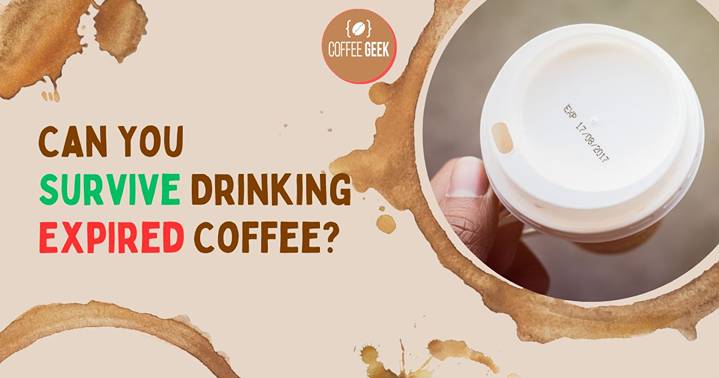
Factors like moisture, oxygen, and temperature can all affect the shelf life of coffee.
If you want to keep your coffee fresh for as long as possible, store it in an airtight container in a cool, dry place.
Don’t leave it sitting out on the counter or in the fridge with the lid off. By taking care of your coffee, you’ll be able to enjoy a delicious cup every time.
Key Takeaways
- Expired coffee won’t make you sick, but it might not taste very good.
- Factors like moisture, oxygen, and temperature can all affect coffee’s shelf life.
- To keep your coffee fresh, store it in a container (airtight) in a cool, dry place.
Can You Drink Expired Coffee?
If you’re a coffee lover, you’ve probably wondered if it’s safe, if can you drink expired coffee. The answer is yes, but it might not taste as good as fresh coffee.
In this section, we’ll explore what happens if you drink expired coffee, factors that affect coffee’s shelf life, and how long unopened coffee lasts.
What Happens If You Drink Expired Coffee?
Drinking expired coffee is unlikely to make you sick, but it may taste stale, flat, or even rancid.
Coffee beans contain natural oils that can go bad over time, affecting the flavor and aroma of the coffee.
If you drink expired coffee, you may notice a musty or woody taste or even a sour or bitter aftertaste.
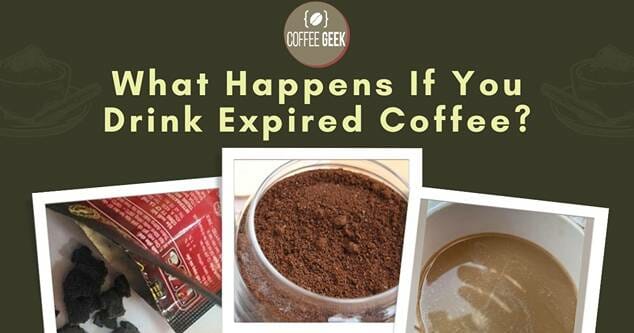
Expired or stale coffee beans may also have a different texture than fresh coffee.
The natural oils in the coffee beans can dry out over time, making the coffee feel gritty or rough in your mouth.
Additionally, expired coffee beans may have lost some of its caffeine content, which means it won’t give you the same energy boost as fresh coffee.
Factors That Affect Coffee’s Shelf Life
Several factors can affect how long coffee lasts, including:
- Storage: Coffee should be stored in a cool, dry place away from sunlight, moisture, and oxygen. Proper storage can help extend the shelf life of coffee and preserve its flavor and aroma.
- Roasting process: The roasting process can affect how long coffee lasts. Lightly roasted coffee beans have a shorter shelf life than dark-roasted coffee beans.
- Grinding: Ground coffee has a shorter shelf life than whole beans because it exposes more surface area to air and moisture.
- Temperature: Coffee should be stored at room temperature, as extreme temperatures can cause the coffee to spoil or lose its flavor.
- Oxygen: Oxygen can cause coffee to oxidize, which can affect its flavor and aroma.
- Moisture: Moisture can cause coffee to spoil or grow mold, which can be harmful to your health.
How Long Does Coffee Last?
The shelf life of coffee depends on several factors, including the type of coffee, how it’s stored, and how it’s brewed.
Here’s a general guideline for how long coffee lasts:
- Whole bean coffee: 6-9 months
- Ground coffee: 3-5 months
- Instant coffee: 2 years
- Brewed coffee: 1-2 hours
Keep in mind that these are just general guidelines, and the shelf life of coffee can vary depending on the factors we mentioned above.
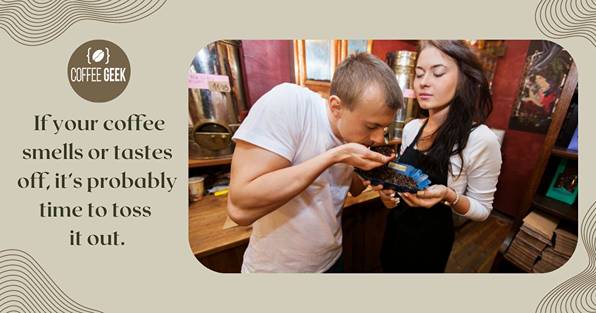
In conclusion, while it’s safe to drink expired beverages, it may not taste as good as fresh coffee.
To ensure the best flavor and aroma, store brewed coffee properly and use it within its recommended shelf life.
And if you’re ever in doubt, trust your senses – if your coffee smells or tastes off, it’s probably time to toss it out.
What Happens When Coffee Expires
When coffee expires, it goes through a few changes that affect its flavor, aroma, and safety. Here’s what you can expect when coffee expire:
Flavor and Aroma Changes
Expired coffee won’t taste or smell as good as fresh coffee. It will have a stale, flat, or even rancid taste and aroma.
You may also notice some off-flavors, such as musty, earthy, or woody notes.
These changes happen because coffee beans lose their volatile oils and other flavor compounds over time.
The longer the old coffee beans sit, the more they oxidize and degrade.
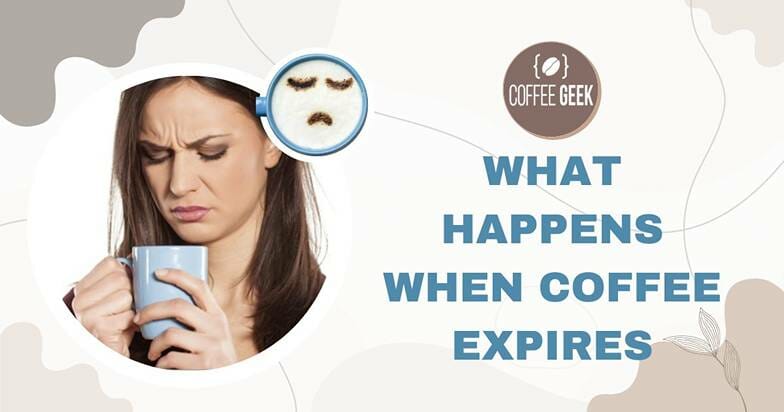
Mycotoxins and Safety Concerns
Mycotoxins are toxic substances produced by certain molds that grow on coffee beans. These molds can thrive in warm, humid, and poorly ventilated environments.
If you are drinking coffee that has been contaminated with mycotoxins, you may experience symptoms such as nausea, vomiting, diarrhea, headache, or fever.
However, the risk of mycotoxin contamination in coffee is relatively low, and most commercial coffee undergoes quality control measures to prevent it.
Expired coffee can also harbor harmful bacteria or fungi that can cause food items poisoning or other health problems.
If you notice any signs of moldy coffee, such as a fuzzy or slimy film on the coffee surface, or a sour or musty smell, discard the coffee immediately.
Don’t take any chances with your health past the expiration date.

In summary, drinking expired coffee won’t kill you, but it won’t taste or smell great either.
It’s best to use fresh coffee beans or grounds to enjoy the full flavor and aroma of coffee.
If you have some old black coffee just lying around, try using it as a natural exfoliant for your skin or as a deodorizer for your fridge.
You never know what creative uses you can come up with for expired coffee!
Factors that Affect Coffee’s Shelf Life
When it comes to coffee, the shelf life can vary depending on several factors. Here are some of the key factors that affect coffee’s shelf life:
Storage Conditions
The way you store your coffee is crucial in determining its shelf life. Coffee should be stored in a cool, dry place away from sunlight, moisture, and oxygen.
Exposure to these elements can cause the coffee to spoil quickly. It is best to store coffee in an airtight container to prevent air and moisture from getting in.
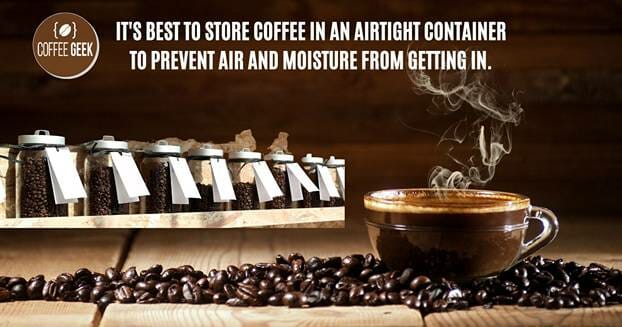
Roasting Process
The roasting process plays a significant role in the shelf life of coffee.
Darker roasts tend to have a longer shelf life because the roasting process removes moisture from the whole beans, making them less prone to spoilage.
On the other hand, lighter roasts have a shorter shelf life because they contain more natural oils that can spoil quickly.
Grinding
Coffee grounds have a shorter shelf life than whole-bean coffee because they have a larger surface area that is exposed to air and moisture.
It is best to grind your coffee just before brewing to ensure brew coffee has maximum freshness.
Type of Coffee
The type of coffee you have can affect its shelf life.
Specialty coffee, for example, has a shorter shelf life than regular coffee because it contains more natural oils that can spoil quickly.
Instant coffee, on the other hand, has a longer shelf life because it has been processed to remove moisture.
Packaging
The packaging of your coffee can also affect its shelf life.
Coffee should be stored in a bag with a one-way valve that allows carbon dioxide to escape while preventing air and moisture from getting in.
Transparent containers should be avoided because they allow sunlight to penetrate, which can cause the coffee to spoil quickly.
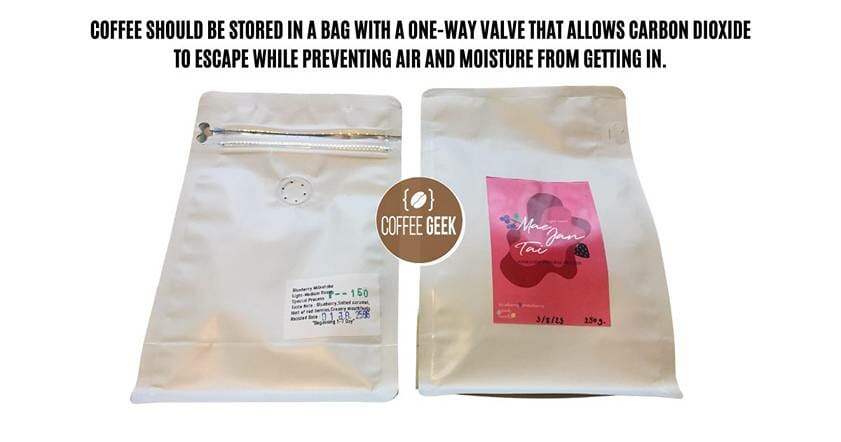
In conclusion, proper storage and packaging, the roasting process, grinding, and the type of coffee all play a significant role in determining the shelf life of coffee.
By taking care to store your coffee in a cool, dry place, away from sunlight and moisture, you can ensure maximum freshness and flavor.
How Long Does Coffee Last?
You love a good cup of coffee, but sometimes life gets in the way and that bag of whole beans or canister of grounds ends up sitting on the shelf for longer than you intended.
So, how long does coffee last? The answer is not as straightforward as you might think.
Ground Coffee
Ground coffee has a much shorter shelf life than whole beans because it has more surface area exposed to oxygen.
On average, pre-ground coffee can last for 3-5 months past its expiration date if stored properly.
However, if you notice a change in color, texture, or aroma of ground coffee, not forgetting to mention who flat it will taste, it may be time to toss it.
Brewed Coffee
Brewed coffee is best consumed immediately after brewing, but if you need to store it, it can last up to 24 hours in the fridge.
After that, the flavor and aroma will start to degrade, and the coffee will become stale.
Whole Bean Coffee
Whole bean coffee has a longer shelf life than ground coffee because the natural oils that give store ground coffee its flavor and aroma are still intact.
If properly stored, whole-bean coffee can last up to 6 months past its expiration date.
Instant Coffee
Instant coffee has the longest shelf life of all coffee types because it is freeze-dried. It can last up to 20 years past its expiration date if stored properly.
When it comes to coffee storage, there are a few things to keep in mind. Oxygen, moisture, and sunlight are the enemies of fresh coffee.
Coffee should be stored in a cool, dry place away from sunlight and moisture.
It is best to store coffee in an airtight container, such as a vacuum-sealed canister or a resealable bag with the air pressed out.
While coffee can technically last for years, it is best to consume it within a few months of its roast date for maximum freshness and flavor.
If you find yourself with a bag of coffee that is past its prime, it is still safe to drink, but the flavor and aroma may be less than desirable.
So, there you have it. The shelf life of coffee depends on factors such as storage conditions, type of coffee, and roast date.
By storing your coffee properly, you can extend its shelf life and enjoy a fresh cup every time.
Frequently Asked Questions
Can drinking expired coffee make you sick?
Yes, drinking expired coffee can make you sick. While it’s unlikely to cause serious harm, it can lead to an upset stomach, nausea, or vomiting.
What happens if you drink old coffee?
If you drink old coffee, it may taste stale or bitter, but it’s unlikely to cause serious harm. However, it’s important to note that the longer coffee sits, the more likely it is to develop harmful bacteria.
How long can you safely drink coffee after the expiration date?
The length of time you can safely drink coffee after the expiration date depends on various factors, such as how the coffee was stored and the type of coffee. As a general rule, coffee should be consumed within one to two weeks of the expiration date.
What are the risks of drinking expired coffee?
The risks of drinking expired coffee include potential bacterial growth, which can lead to food poisoning or other illnesses. Additionally, expired coffee may taste stale or bitter, which can be unpleasant to drink.

